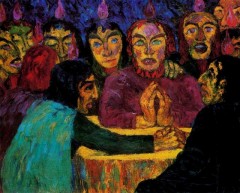This morning's service was based on the Ezekiel 37 vision of the valley of dry bones. Arising from my reading of the passage, along with the Pauline body imagery in 1 Corinthians 12 and Romans 12, I wanted to be able to reflect some of the diversity of God-given gifts and personalities in our church community.
So, we had a response in movement, led by someone who is a dancer, assisted by the children of Sunday School, which celebrated the wonder of our hands.
We had a response from an eminent physician (an oncologist) noting that no matter how clever stem-cell therapies may become they will never actually create life, and that life is more than mere physical functioning
We had a piece of silver jewellery specially crafted by one of our students, with a commentary explaining its significance... some very profound linking of theology, the choice of materials and the process of crafting.
We had this picture by Emil Nolde, entitled Pentecost, along with some thoughts on it, notably the significance of the hands of the participants, from an art historian

We had a new setting of 'sing a new song to the Lord' composed by our pianist, who noted the juxtaposition of old and new, and the inevitability of change however we might resist or regret it.
I then spoke a bit about the idea of the Ezekiel 'army' as a corps - a body of people, each unique and all marching to the drumbeat of God's heart. I posited the idea that Romans 12 and 1 Corinthians 12 actually continue where Ezekiel leaves off, and apply both locally and trans-locally. I think it just about worked!
The children had fun making dangly skeletons and balloon figure, and the feedback was that people had really appreciated the diversity and creativity, which was precisely what I'd hoped for.
A good day methinks. This evening is a Churches Together 'Evensong' for Pentecost at the Piskie (Anglican) Cathedral, just round the corner and along the road.
 This one was seen at Manchester Airport on a series of blus plastic boxes arranged, so far as I could tell to catch water seeping through the ceiling/roof due to some sort of leak.
This one was seen at Manchester Airport on a series of blus plastic boxes arranged, so far as I could tell to catch water seeping through the ceiling/roof due to some sort of leak.



 Just one quickly uploaded picture from my holiday in Hungary. A beautiful country with friendly people, whose humour seems similar to that of us Brits.
Just one quickly uploaded picture from my holiday in Hungary. A beautiful country with friendly people, whose humour seems similar to that of us Brits.